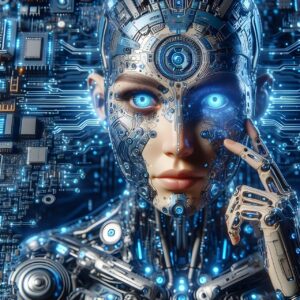AI is an assistant for human, not competent. While AI technology has made remarkable strides in assisting humans across a wide range of fields, it is not yet capable of replacing human intelligence, creativity, emotional intelligence, or ethical decision-making.
Definition of AI
Artificial Intelligence (AI) is a field of computer science dedicated to developing machines and software designed to perform tasks that usually require human intelligence. These tasks include:
Key Characteristics of AI:
- Learning: AI systems learn from data through algorithms, improving their performance over time (e.g., machine learning).
- Reasoning: AI can make decisions or solve problems based on input data.
- Perception: AI can interpret data from the real world, such as images, sounds, and text (e.g., image recognition, speech processing).
- Natural Language Understanding: AI can understand and respond to human languages, enabling chatbots, translators, and virtual assistants.
- Automation: AI automates repetitive or complex tasks efficiently and without fatigue.
Types of AI
- Narrow AI (Weak AI): Specialized in performing a single task, like virtual assistants (Siri, Alexa) or recommendation systems.
- General AI (Strong AI): Hypothetical AI that can perform any intellectual task a human can do (still under research and development).
- Superintelligent AI: A future concept where AI surpasses human intelligence in all aspects (subject of debate and speculation).
Common Applications of AI:
- Healthcare: Diagnosing diseases, personalized medicine, and medical imaging.
- Finance: Fraud detection, trading algorithms, and customer support.
- Education: Personalized learning, grading systems, and virtual tutors.
- Gaming: Creating adaptive, intelligent opponents or immersive experiences.
- Transportation: Autonomous vehicles and traffic management systems.
- Content Creation: Writing, editing, and generating music or art.
AI relies on technologies like neural networks, deep learning, and natural language processing (NLP). It’s rapidly evolving and becoming a transformative force in almost every industry.
This statement is essential in understanding the current state of artificial intelligence (AI) in our modern world. AI technology has rapidly evolved, making its presence known in various fields such as healthcare, finance, education, and even in personal tasks. However, as impressive as AI’s capabilities are, there is a critical distinction to be made: AI is an assistant for human, but it is not yet competent enough to replace human intelligence, decision-making, and emotional nuances. In this blog post, we will explore five strong and relevant reasons why AI remains an incredible tool but falls short of being truly competent in comparison to human abilities.
Lack of Emotional Intelligence and Empathy
One of the most defining qualities of human beings is our emotional intelligence. Humans are capable of understanding, interpreting, and responding to complex emotions. We can empathize with others, provide comfort, and navigate emotionally charged situations with care and sensitivity.
AI, on the other hand, is purely logic-driven. While advancements in AI, such as Natural Language Processing (NLP) and sentiment analysis, have enabled machines to understand emotional cues in language, they lack the ability to genuinely experience or respond to emotions in the way humans do. For instance, AI can recognize when someone is sad based on tone or word choice, but it cannot truly “feel” the sadness or offer personalized emotional support.
This deficiency in emotional intelligence makes AI less competent in tasks that require empathy, such as counseling, caregiving, or any profession where human connection plays a pivotal role. Until AI can truly replicate human emotional intelligence (if that is even possible), it will remain an assistant rather than a replacement in these fields.
Contextual Understanding and Common Sense

AI systems are excellent at processing large amounts of data and identifying patterns, but they often struggle with contextual understanding and common sense reasoning. Humans possess a deep understanding of the world and can make decisions based on years of life experience, cultural knowledge, and common sense.
For example, if you ask an AI to “book a restaurant reservation for two on Friday night,” it can perform the task with relative ease. However, if you ask the same AI to “book a romantic restaurant for two where the atmosphere is cozy and intimate,” the AI may struggle because it lacks the ability to interpret subjective qualities like “romantic” and “cozy.” While AI can be trained to recognize these qualities in a limited context, it cannot fully grasp the nuances that come from human experiences and subjective opinions.
Common sense reasoning also poses a challenge for AI. Humans can easily infer things based on everyday logic — for example, knowing that you should not put metal in a microwave or that a cup of coffee is hot. AI lacks this inherent common sense and requires explicit instructions to avoid making mistakes that humans would naturally avoid. This gap in contextual and common sense understanding underscores why AI is not yet competent enough to handle all tasks independently.
Ethical and Moral Decision-Making

Ethics and morality are deeply rooted in human societies, shaped by culture, religion, and personal experiences. These values guide human decision-making in complex situations, especially when there is no clear right or wrong answer.
AI, however, is bound by the data it is trained on and the algorithms it follows. While it can process ethical frameworks or laws, AI lacks the ability to apply moral judgment in the same way humans do. For instance, self-driving cars may be programmed to minimize harm in an accident, but they cannot make ethical decisions in real-time with the same depth as a human driver faced with a moral dilemma.
Additionally, AI systems are only as impartial as the data used to train them. If the training data is biased, the AI will make decisions that reflect those biases, even if they are unethical. Humans, on the other hand, have the capacity to recognize and challenge biases, reflect on ethical considerations, and make decisions that align with their personal or societal moral codes.
This inability to navigate moral and ethical gray areas is a significant reason why AI remains an assistant — not competent enough to replace human decision-makers in situations that require ethical reasoning.
Creativity and Innovation
One of the most extraordinary qualities of the human mind is its ability to think creatively and innovate. Humans have the capacity to come up with original ideas, solve problems in novel ways, and express themselves through art, literature, music, and other creative endeavors.
AI can mimic creativity to some extent. For example, AI can generate artwork, write music, or even compose essays by using algorithms to analyze and replicate existing data. However, this is not true creativity; it is more of an imitation. AI lacks the intrinsic ability to create something entirely new or break away from established patterns. It cannot experience the “eureka” moments of inspiration that humans do when solving problems or creating something groundbreaking.
Furthermore, creativity often involves understanding and embracing ambiguity, something AI struggles with. Human innovators thrive in uncertain and ambiguous situations, using intuition, imagination, and experimentation to develop new solutions. AI, on the other hand, requires clear instructions and defined parameters to function. This limitation highlights why AI can assist in creative processes but cannot fully replace the human capacity for innovation.
Dependence on Human Oversight and Data

AI is a powerful tool that excels in processing data, automating tasks, and making predictions based on patterns. However, AI systems are entirely dependent on the quality and quantity of data they are given. If the data is flawed, biased, or incomplete, the AI’s output will be similarly flawed.
Moreover, AI requires human oversight to ensure it functions correctly. For example, machine learning models need to be trained, tested, and validated by data scientists to ensure accuracy. Even after deployment, AI systems require regular monitoring and fine-tuning to avoid errors or unintended consequences.
This dependence on human input and oversight underscores the fact that AI, while capable of handling certain tasks autonomously, is not self-sufficient. It relies on human intervention to correct mistakes, update data, and ensure it remains relevant. As long as AI remains dependent on humans for guidance and oversight, it will remain a valuable assistant rather than a fully competent entity.
Conclusion
AI is an assistant for human, not competent. But AI lacks the depth of understanding, common sense, and moral reasoning that humans possess, and it relies heavily on human oversight and data.
As we continue to develop and integrate AI into our lives, it is important to recognize its strengths and limitations. AI can be a powerful assistant that enhances our productivity, automates mundane tasks, and provides valuable insights. However, it is not a replacement for human competence, and it is unlikely to become one in the near future. Instead, the future of AI lies in collaboration with humans, where it can complement our abilities and help us achieve more than ever before.
In conclusion, AI will remain an invaluable tool and assistant, but the unique qualities of human intelligence will continue to make us indispensable in the world of innovation, decision-making, and emotional connection.
Frequently Asked Questions
- What is AI?
AI, or Artificial Intelligence, refers to computer systems designed to perform tasks that typically require human intelligence, such as problem-solving, learning, and decision-making.
2. Can AI replace humans?
No, AI can assist humans in tasks but lacks the creativity, emotional intelligence, and ethical decision-making required to fully replace human roles.
3. How does AI learn?
AI learns through machine learning, where it is trained on large datasets and adjusts its algorithms to improve performance over time.
4. Is AI unbiased?
AI can inherit biases from the data it is trained on, meaning it is only as objective as the data it processes.
5. What are common uses of AI?
AI is used in virtual assistants, customer service chatbots, healthcare diagnostics, self-driving cars, and data analysis, among many other fields.





